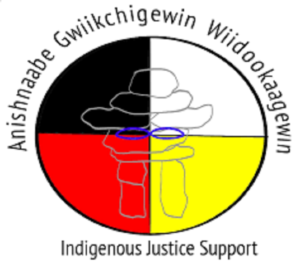Justice coordinators seek equity for Indigenous people in justice sector

By Colin Graf
WATERLOO—Workers helping First Nations people in the justice system are using their knowledge and experience to add pressure for changes in the wake of the Colten Boushie killing verdict.
The five Indigenous justice coordinators from across southwestern Ontario are calling on the Prime Minister, federal Justice Minister, and Ontario Attorney-General to address the need for equity for Indigenous people in the justice sector “to repair the injustices and betrayals that have occurred and continue to occur.”
The coordinators, who help guide First Nations people with legal issues in some of Ontario’s largest cities, call on the two levels of government to implement three separate Calls to Action by the Truth & Reconciliation Commission. They hope that their letter encourages improvements in light of the verdict in the Colten Boushie death, says Luane Roberts, IJC in the Kitchener-Waterloo region.
The letter says First Nations have “a justified, continuing mistrust of the justice system as Indigenous people have been overrepresented in the legal system, marginalized, traumatized and retraumatized due to legal processes, a legal system that has not allowed for the integration or even recognition of Indigenous laws and legal principles.”
The writers, who work with First Nations from Mississauga to Guelph and the Kitchener-Waterloo region, Hamilton, St. Thomas, Woodstock, Windsor, and Sarnia, call for the implementation of the TRC’s 94 Calls to Action and the endorsement of the United Nations Declaration on the Rights of Indigenous People (UNDRIP).
They are also seeking an inquiry into Colten Boushie’s death as well as the treatment of his family during the investigation process. While the acquittal of the Saskatchewan farmer accused in Boushie’s death will not be appealed by the Crown, Roberts says recent news that the RCMP’s conduct will be reviewed by the Civilian Review and Complaints Commission is a positive development.
Increased and permanent funding for programs such as the writers’ own Indigenous Justice Program, to address “the pervasive systemic barriers present in our justice system,” is another call in the letter. They say adding to the help the coordinators provide will facilitate “a trusting, collaborative relationship in which Indigenous Laws and Legal traditions are respected and utilized.”
Their network of Coordinators, funded by Legal Aid Ontario, is “an important example” of how First Nations-centered services “creates an environment where trust can grow between Indigenous people and members of the justice sector,” but that type of program is far from universal and large gaps exist in the provision of services, according to the letter. More work needs to be done federally and provincially to ensure the availability of such programs to all Indigenous people, the writers explain to the politicians.
“We really want to try and make sure our positions are expanded through all of Ontario. There is such a need for this [work] because there is a huge distrust of the legal system by Indigenous people,” says Roberts.
‘Why would I want to access these services with such a fear of systemic racism?’ is a question frequently asked in her work, she says.
The Indigenous Justice Program is established and delivered by Community Legal Clinics in Southwestern Ontario and funded by Legal Aid Ontario.
They also want Ottawa to fund the establishment of “Indigenous law institutes” to develop laws and access to justice in accordance with the unique cultures of Aboriginal peoples in Canada, as recommended by the TRC.
While there have been many calls for change in First Nations’ justice, the coordinators feel they need to add their voices since “we really have a good platform” in their roles, and a wealth of experience in their daily work to help add weight to their comments, Roberts says.
They are asking the political leaders to read “A Journey to ReconciliAction” developed by Hamilton Community Legal Clinic, as an example for how the TRC Calls to Action can be implemented.
Roberts hears of frequent inequities in the system, as when two First Nations’ people accused of similar crimes were up for bail hearings recently in her area. One was represented by a lawyer who was familiar with the Gladue ruling that encourage judges to consider special factors that impact First Nations, such as discrimination, institutional or personal abuse, dislocation from culture or family, substance abuse. That person was granted bail, says Roberts, while the other, whose lawyer did not cite Gladue in court, was not released. IJCs can educate clients and lawyers on matters such as Gladue, she explains.
In her work helping clients who are trying to qualify for the Ontario Disability Support Program (ODSP), Roberts find officials are not familiar with the intergenerational trauma caused by the legacy of residential schooling, and the post-traumatic stress some First Nation people suffer from.
“These things are very debilitating”, and should be considered when First Nation people apply for ODSP, she says.


